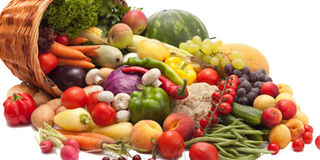Diet for women after 40

As you approach 40, it is important to know that aging does not have to equal weight gain. Dr Joseph Nsengiyumva, a gynaecologist at Bethany Women’s Hospital in Luzira, says some women are likely to gain weight due to a drop in activity and hormonal changes which cause a shift in body composition such as slow metabolism.
“In most cases, this is the time forgetfulness, impatience, hot flashes, low energy, less libido, will all set in for most women but how you eat and live contribute significantly to how you transition into the menopause stage,” he says.
Calcium
Women in their middle age also have a genuine need for calcium as well Vitamin D required for its proper absorption. At this stage, the oestrogen levels in the body start to fall, which leads to unexplained weight gain.
Dr Nsengiyumva says, “With less oestrogen in the body, the bones do not absorb enough calcium so they start to weaken, leading to bone degeneration. The body has greater need of calcium intake to help reduce your risk of osteoporosis and bone fractures as you age.”
Eating low fat dairy products such as yoghurt or milk, spinach, broccoli, kale, cabbage, celery, turnip, mushrooms and lettuce will be useful at this age.
Lean proteins
Jamiru Mpiima, a nutritionist at Victoria Wellness Centre, says getting enough protein is key to keeping your metabolism accelerated. Protein-rich foods are among the top foods to eat to lose weight. For every meal, include a plant-based protein or a lean animal-based protein. These include chicken, fish, beef, eggs, beans, and lentils, or dairy products.
“Lean proteins prevent slowing down your metabolism which will in turn keep you from getting tired. It is recommended to have a bigger portion of the protein at breakfast as you start the day and lesser portions throughout the day,” Mpiima says. He also advises that women at this age should reduce their intake of heavy carbohydrates to simpler and easy to digest carbohydrates.
Fruits and vegetables
The beta-carotene in the pumpkin is linked to lowering the risk of breast cancer. Any red, yellow, purple, orange fruits as well as dark leafy greens are usually packed with carotenoids which are healthy antioxidants.
In addition to beta-carotene, tomatoes also contain lycopene antioxidant which is a potential cancer-fighter. Watermelon, pawpaw and pink guava are all good sources of lycopene.
“The antioxidant nutrients contained in some of the vegetables help your body to turn glucose into energy and keeps your blood sugar levels in check thus lowering the rate of diabetes, stroke and glaucoma. These will help with anti-aging, giving you beautiful, glowing skin and shiny hair,” he says.
Fibre
Declining digestive health and issues related to improper digestion often lead to inflammation-related conditions that hit women during middle-age. Getting enough fibre in the diet helps to prevent most of these problems.
Fibre can be found in whole grains such as millet, rice and wheat but can also be found in fruits such as avocado. Most fruits and vegetables are also great sources of fibre, as are many plant-based protein sources such as beans, peas and lentils.
Soy
Jamiru Mpiima, a nutritionist, says isoflavones in soy beans have been linked to lowering cholesterol, increasing bone density in post-menopausal women. Soy contains plant estrogens to boost up your lowering oestrogen levels.
Soy foods, soy nuts, and soy milk may offer relief from mild hot flashes and are thought to reduce breast cancer risk. Soy products are said to improve menopausal symptoms such as hot flashes.




